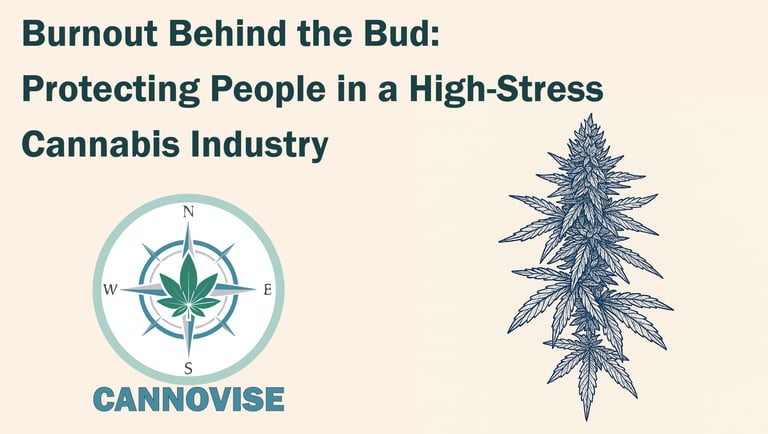Burnout Behind the Bud: Protecting People in a High-Stress Cannabis Industry
A growing issue that many operators are reluctant to address: Burnout.
William Kanistras
5/15/20254 min read


In an industry known for innovation, resilience, and a strong sense of purpose, it’s easy to overlook the human toll behind the scenes. The cannabis space is fast-paced by nature; regulatory frameworks evolve constantly, margins remain tight, and teams are expected to operate with both precision and flexibility under pressure. But beneath that momentum lies a growing issue that many operators are reluctant to address: BURNOUT.
While much of the conversation around cannabis centers on the plant, we need to start talking more seriously about the people: the ones cultivating, packaging, managing, testing, and building. Burnout is real. It's avoidable. And it’s quietly eroding the stability of an industry still finding its footing.
Understanding Burnout in Cannabis Operations
Burnout in this context isn’t just about long hours or late nights. It’s more complex, the result of sustained stress combined with limited support structures. Operators, managers, and staff often feel the weight of wearing multiple hats while navigating a landscape that offers little room for error and even less time to recalibrate.
At Cannovise, we’ve worked with operators who are exceptional at managing compliance, financials, and crop quality; yet they struggle to maintain a sustainable, healthy internal culture. Too often, the focus is exclusively on systems, metrics, and market share, with little thought given to the emotional and mental resilience of the team executing it all.
Signs You’re Facing a Burnout Problem
Burnout can be hard to spot in real-time because it often looks like dedication until it doesn’t. Here are a few warning signs that deserve your attention:
High turnover, especially in roles with direct operational pressure
Frequent miscommunications or repeated mistakes
A reactive work culture where teams are always in "fire drill" mode
Low morale, even among high performers
Leaders or founders consistently working in, not on, the business
What’s most dangerous is that these symptoms are often normalized. In an industry still fighting for legitimacy and market share, we tend to dismiss burnout as a necessary side effect of growth. But it’s not.
Why Burnout Happens and Why It Matters
The cannabis industry’s startup energy is its strength and its Achilles’ heel. Many businesses scale quickly without investing in foundational infrastructure, not just systems and SOPs, but communication channels, role clarity, and organizational feedback loops. This leads to confusion, inefficiency, and frustration.
Burnout isn’t just a human issue; it’s a business risk. When turnover rises, institutional knowledge walks out the door. When teams operate in survival mode, mistakes increase, some of which carry regulatory consequences. And when leadership is stretched too thin, strategic vision takes a backseat to daily urgency.
Burnout costs money. It stalls growth. And left unchecked, it can lead to a toxic work environment that undermines everything you’re building.
How to Create a More Sustainable Work Culture
Creating a people-centered culture doesn’t mean slowing down or sacrificing results. Businesses that actively prevent burnout tend to be more productive, compliant, and better positioned for long-term success. Here are a few strategies to consider:
1. Operational Clarity Is a Form of Care
Unclear roles and responsibilities are one of the fastest paths to burnout. Define who owns what. Ensure SOPs are accessible, relevant, and updated regularly. A team can’t operate efficiently if everyone is guessing what’s expected of them.
2. Normalize Communication Beyond Compliance
Cannabis companies often have rigorous systems for documentation and audits, but little structure around internal feedback. Create regular check-ins. Use anonymous surveys. Encourage staff to give upward feedback. When employees feel heard, they’re far more likely to stay engaged and build a career with a company.
3. Design Workflows for Real People
Complex workflows may look impressive on paper, but if they are not functional for the team on the ground, they will not hold up. At Cannovise, we consider this a foundational principle. Years of experience have shown us that designing systems with the end user in mind and not just the auditor or investor is vital. When workflows are practical, intuitive, and grounded in how people operate day to day, they reduce stress, increase consistency and productivity, minimize quality control and customer service challenges, and ultimately lead to increased revenue.
4. Treat Recovery as a Strategic Investment
Recovery doesn’t require a complete pause; it does require intention. Whether empowering flexible scheduling after high-stress periods, encouraging real lunch breaks, or limiting after-hours communications, recovery time protects productivity in the long run.
5. Reinforce Wins Beyond Revenue
It’s easy to celebrate sales targets and harvest yields, but don’t overlook the small, meaningful wins that improve your business. Recognize the technician who revamped the labeling process or the manager who improved team scheduling. Culture is shaped by what you reward.
Leading with People in Mind
At Cannovise, we believe that the health of your business is directly tied to the health of your people. Our work often starts with systems, but the long-term value comes from helping teams create a culture of resilience, where structure supports creativity, and compliance coexists with well-being.
Burnout shouldn’t be the norm in an industry rooted in healing. Let’s build companies where people are protected, heard, and empowered.
The cannabis industry is evolving. It’s time our approach to leadership evolves with it.
Need help building systems that support both your operations and your team?
That’s what we do. At Cannovise, we design people-friendly SOPs, audit-proof workflows, and sustainable infrastructure that scales with you, not against you.
Reach out when you're ready to make things work better.
Your partner in cannabis compliance and operations.
info@cannovise.com
© 2025. All rights reserved.
